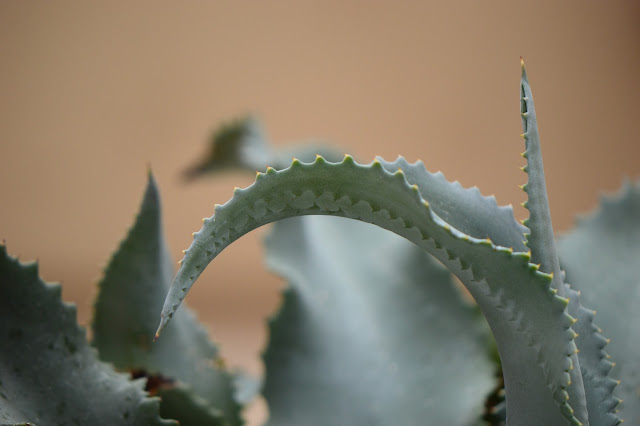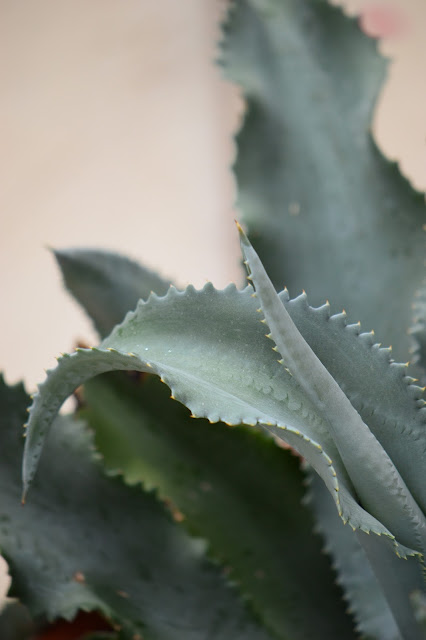And agaves have finally joined the garden...
Agave angustifolia "Marginata" is fairly common around here, which promises well for its survival. I have it tucked back into the southeast corner, which is currently being worked out and planted up. It must like its position since it sent up a pup overnight after planting! Its fresh, almost mint, green is very refreshing in the garden.
There is also Agave marmorata, though this latter is being kept in a container on the back patio. We realized belatedly that it would grow too large to be safe in the front planter (safe for foot traffic back and forth, that is). So it went into one of our largest pots, from which it is now smiling rather spinily at the world. It was a must-purchase which came from the clearance table at a local box store; it was in fairly good condition then and has only improved since coming home. The colour is a sculptural grey-blue with a powdery sheen.
It was my intention to focus only on the two agaves for Garden Bloggers Foliage Day. But with the milder weather we are having, many foliage plants are coming into their own again. So I can't resist sharing a few more leaves from around the garden. For instance, a couple of Australians...
Acacia salicina...
...and Senna nemophila. For months after planting I worried about the survival of the Senna, but it has finally taken hold and is now a mist of soft green beneath the Acacia.
Technically speaking, neither of these are leaves, but rather phyllodes, a form of flattened petiole seen in a number of Australian species, particularly Acacias. They are adapted for photosynthesis and so function essentially as leaves.
Clearly not leaves, but still playing the role of foliage in the garden, are the wonderful stems of Euphorbia trinculli "Firesticks". They make a good splash of colour and are growing well.
And lastly for today, a few true leaves, the ferny foliage of Caesalpinia pulcherrima...
...which will not flower till next summer as it is a very young plant, but the foliage is attractive in itself.
There are many other fine foliage plants right now: lavender, hamelia, and eremophilas; but they will have to wait for another day. Linking with Christina at Garden of the Hesperides for this October's Garden Bloggers Foliage Day, which is an excellent time to take a look round at the plants that often make up the main structure of the garden.
Weather Diary: Fair; High: 77 F (25 C)/Low: 57 F (14 C)








Oh, I love your agaves, And your photos of them! And that Senna nemophila. And the euphorbia... Wonderful!
ReplyDeleteI'm having a wonderful time with the foliage plants just now, Janet - as you can see :)
DeleteI love the silver/blue of that Agave Amy. It must really stand out and will truly be a marvelous addition to your garden. The soft ferny foliage Caesalpinia is beautifully lush and incredibly healthy looking. Super October foliage.
ReplyDeleteI've begun really admiring the colours available from the agaves, Angie - they seem to have range of their own. I'm going native at last, I suppose ;-) The Caesalpinia foliage is such a treat as I don't think ferns would stand a chance here, and then to get bloom in the worst days of summer... hard to beat!
DeleteWhat wonderful photos of such beautiful foliage Amy! Loved that Senna and the Caesalpinia.
ReplyDeleteThanks so much, Kate! The Senna and Caesalpinia both promise well since they require less coddling but provide some nice structure for the garden - something that is badly needed ;-)
DeleteWatch out - agave ownership can become an addiction!
ReplyDeleteI can feel it coming on, Kris... ;-)
DeleteI have always found agaves so photogenic, as far back as I can remember. Not sure why--maybe the bold striking patterns made by the leaves. So I hope you will post (and plant?) more.
ReplyDeleteI'm just beginning to learn how much variation there is, so I'm pretty sure there will be more ;-)
DeleteReal desert like foliage Amy that is little grown over here, due to our level of rainfall.
ReplyDeleteIs the Senna plant where they get the laxative from?
They are reassuringly well-adapted here; somehow one can feel it just planting them... Yes, it seems that Sennas are the source of the laxative, though I see a reference to S. alexandrina specifically. I don't know whether it would also be derived from S. nemophila.
Delete